Organisational Behaviour Analysis: Google's Strategies (HNBS 312)
VerifiedAdded on 2021/01/02
|11
|3266
|174
Report
AI Summary
This report provides a comprehensive analysis of Google's organisational behaviour, examining its impact on employee performance and overall company success. The report delves into the influence of politics, culture, and power dynamics within Google, highlighting the key components of its innovative, risk-taking, and open communication culture. It explores the motivational strategies employed by Google, including reinforcement theory, equity theory, McClelland's achievement theory, and Maslow's hierarchy of needs, to understand how the company inspires its employees and enhances their skills. Furthermore, the report investigates the approaches Google uses to establish cooperation among team members, addressing potential conflicts and promoting effective teamwork through clear job roles, psychological safety, and resource allocation. The report concludes by emphasizing the significance of these organisational behaviour philosophies in achieving Google's business goals and maintaining a productive and engaged workforce.
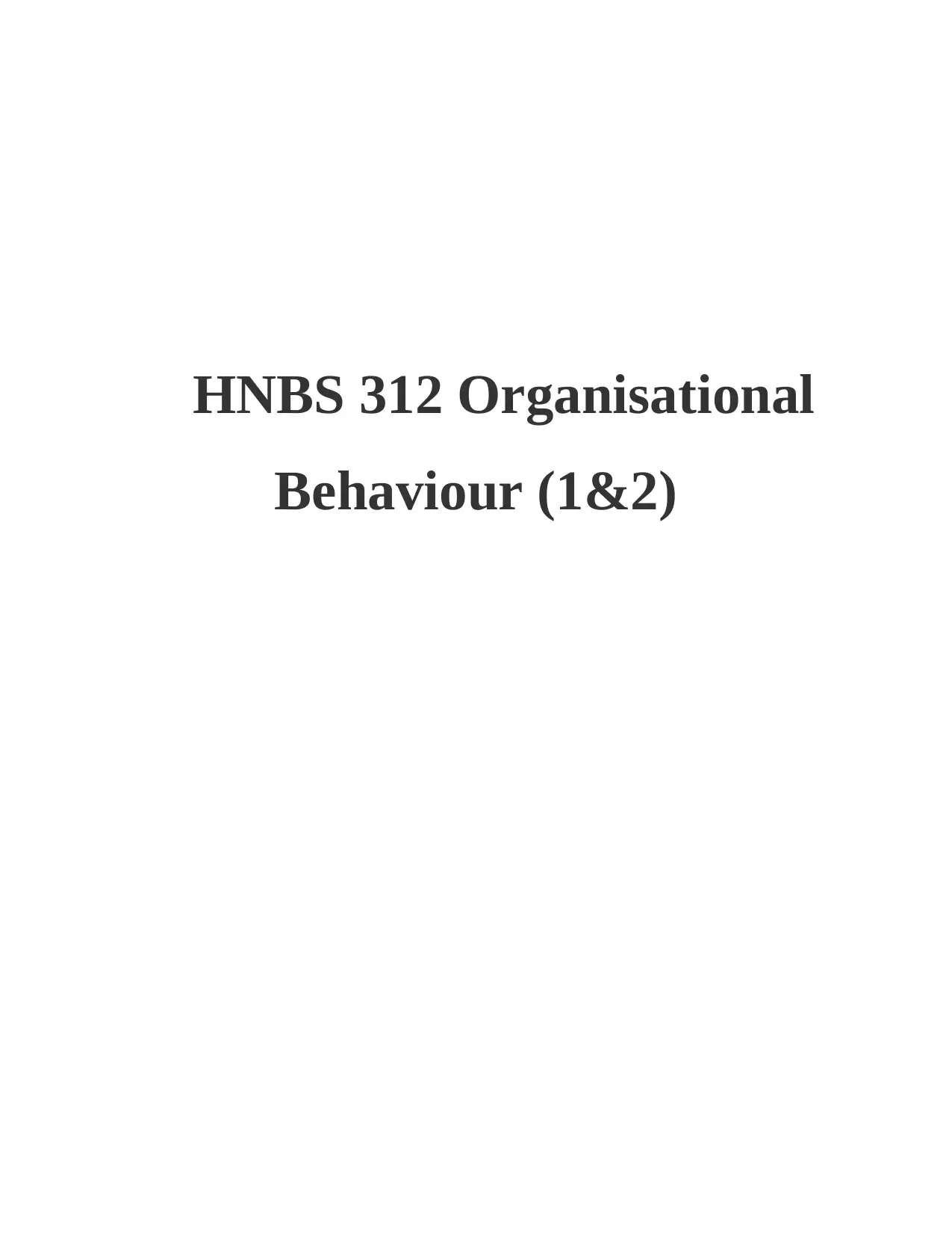
HNBS 312 Organisational
Behaviour (1&2)
Behaviour (1&2)
Paraphrase This Document
Need a fresh take? Get an instant paraphrase of this document with our AI Paraphraser
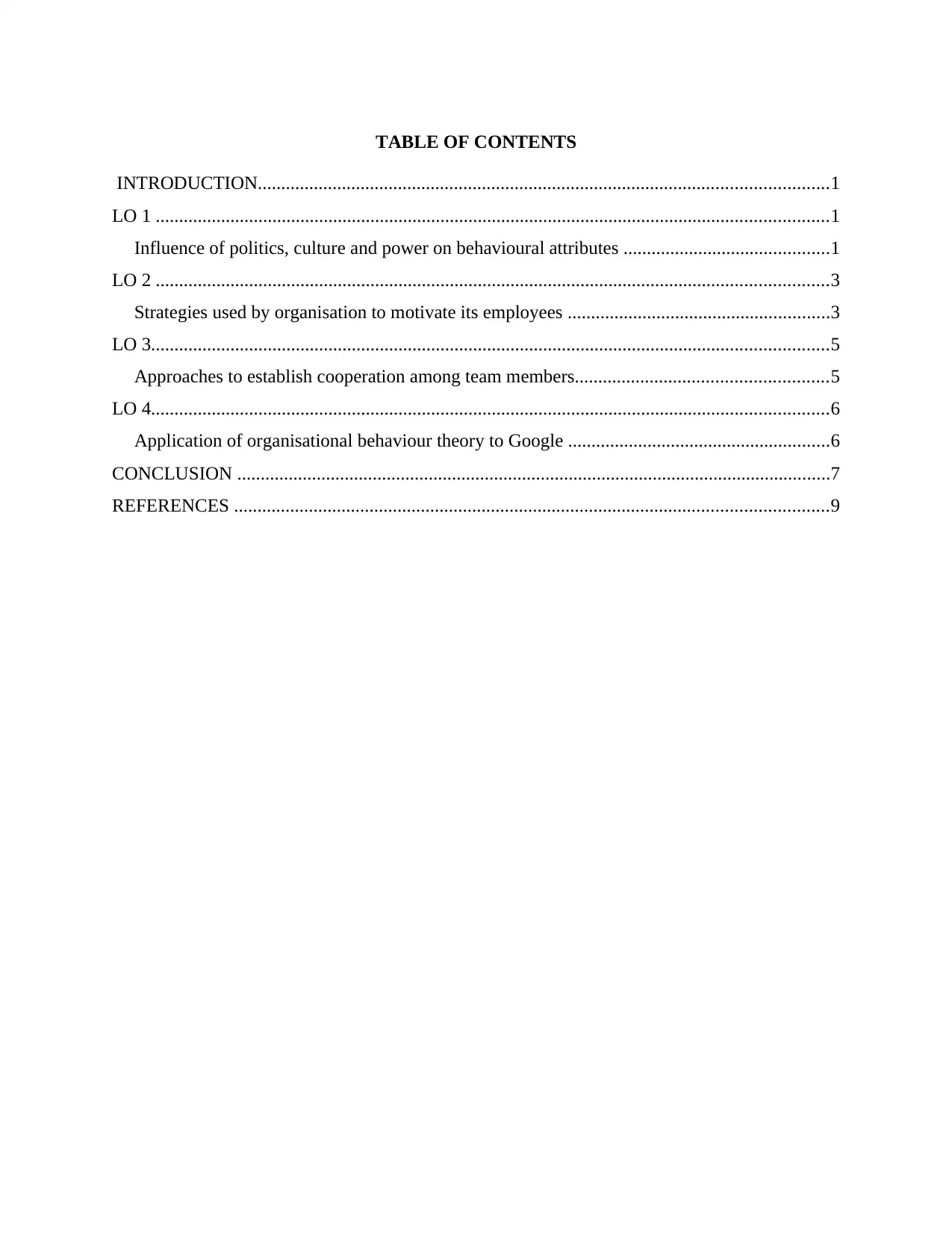
TABLE OF CONTENTS
INTRODUCTION..........................................................................................................................1
LO 1 ................................................................................................................................................1
Influence of politics, culture and power on behavioural attributes ............................................1
LO 2 ................................................................................................................................................3
Strategies used by organisation to motivate its employees ........................................................3
LO 3.................................................................................................................................................5
Approaches to establish cooperation among team members......................................................5
LO 4.................................................................................................................................................6
Application of organisational behaviour theory to Google ........................................................6
CONCLUSION ...............................................................................................................................7
REFERENCES ...............................................................................................................................9
INTRODUCTION..........................................................................................................................1
LO 1 ................................................................................................................................................1
Influence of politics, culture and power on behavioural attributes ............................................1
LO 2 ................................................................................................................................................3
Strategies used by organisation to motivate its employees ........................................................3
LO 3.................................................................................................................................................5
Approaches to establish cooperation among team members......................................................5
LO 4.................................................................................................................................................6
Application of organisational behaviour theory to Google ........................................................6
CONCLUSION ...............................................................................................................................7
REFERENCES ...............................................................................................................................9
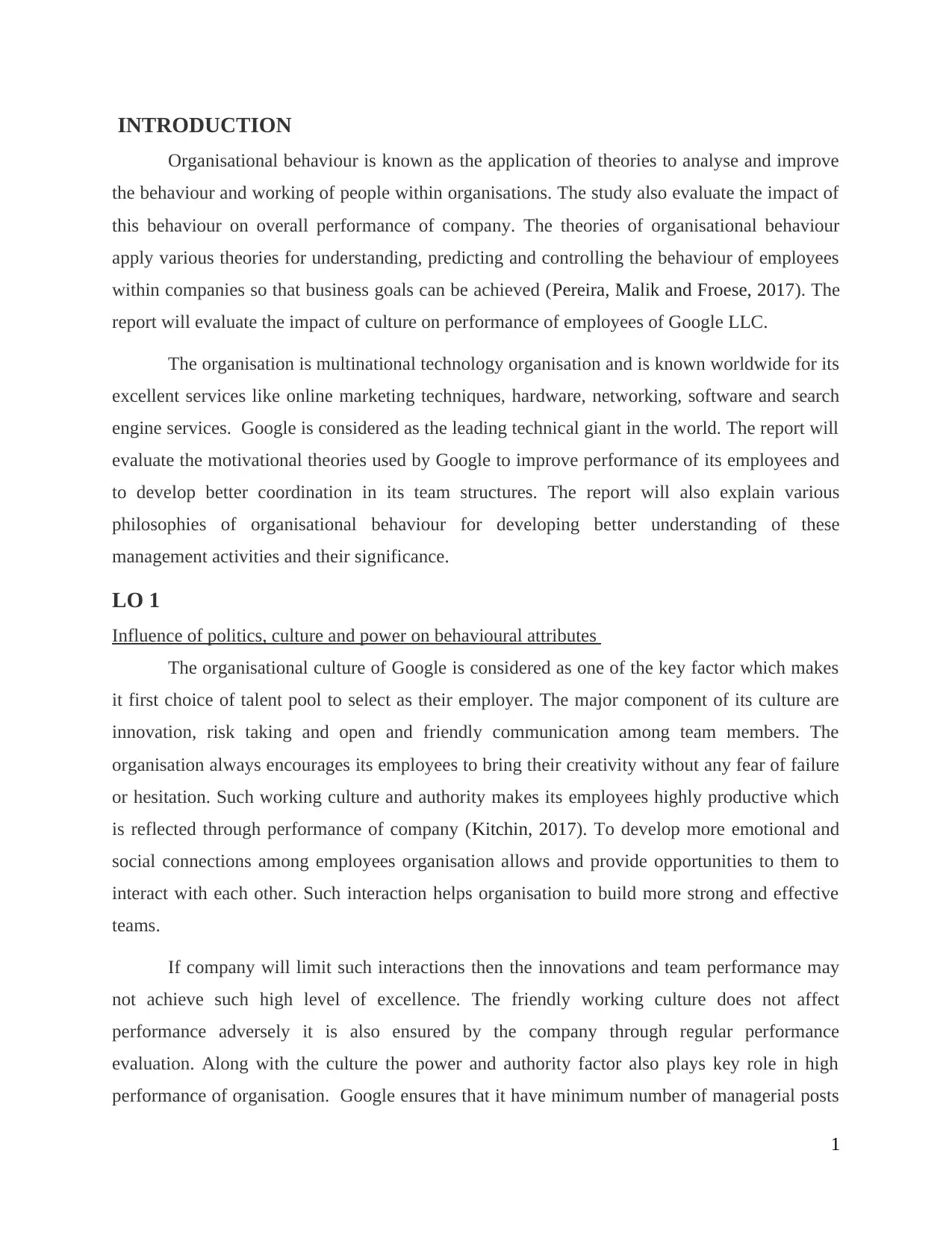
INTRODUCTION
Organisational behaviour is known as the application of theories to analyse and improve
the behaviour and working of people within organisations. The study also evaluate the impact of
this behaviour on overall performance of company. The theories of organisational behaviour
apply various theories for understanding, predicting and controlling the behaviour of employees
within companies so that business goals can be achieved (Pereira, Malik and Froese, 2017). The
report will evaluate the impact of culture on performance of employees of Google LLC.
The organisation is multinational technology organisation and is known worldwide for its
excellent services like online marketing techniques, hardware, networking, software and search
engine services. Google is considered as the leading technical giant in the world. The report will
evaluate the motivational theories used by Google to improve performance of its employees and
to develop better coordination in its team structures. The report will also explain various
philosophies of organisational behaviour for developing better understanding of these
management activities and their significance.
LO 1
Influence of politics, culture and power on behavioural attributes
The organisational culture of Google is considered as one of the key factor which makes
it first choice of talent pool to select as their employer. The major component of its culture are
innovation, risk taking and open and friendly communication among team members. The
organisation always encourages its employees to bring their creativity without any fear of failure
or hesitation. Such working culture and authority makes its employees highly productive which
is reflected through performance of company (Kitchin, 2017). To develop more emotional and
social connections among employees organisation allows and provide opportunities to them to
interact with each other. Such interaction helps organisation to build more strong and effective
teams.
If company will limit such interactions then the innovations and team performance may
not achieve such high level of excellence. The friendly working culture does not affect
performance adversely it is also ensured by the company through regular performance
evaluation. Along with the culture the power and authority factor also plays key role in high
performance of organisation. Google ensures that it have minimum number of managerial posts
1
Organisational behaviour is known as the application of theories to analyse and improve
the behaviour and working of people within organisations. The study also evaluate the impact of
this behaviour on overall performance of company. The theories of organisational behaviour
apply various theories for understanding, predicting and controlling the behaviour of employees
within companies so that business goals can be achieved (Pereira, Malik and Froese, 2017). The
report will evaluate the impact of culture on performance of employees of Google LLC.
The organisation is multinational technology organisation and is known worldwide for its
excellent services like online marketing techniques, hardware, networking, software and search
engine services. Google is considered as the leading technical giant in the world. The report will
evaluate the motivational theories used by Google to improve performance of its employees and
to develop better coordination in its team structures. The report will also explain various
philosophies of organisational behaviour for developing better understanding of these
management activities and their significance.
LO 1
Influence of politics, culture and power on behavioural attributes
The organisational culture of Google is considered as one of the key factor which makes
it first choice of talent pool to select as their employer. The major component of its culture are
innovation, risk taking and open and friendly communication among team members. The
organisation always encourages its employees to bring their creativity without any fear of failure
or hesitation. Such working culture and authority makes its employees highly productive which
is reflected through performance of company (Kitchin, 2017). To develop more emotional and
social connections among employees organisation allows and provide opportunities to them to
interact with each other. Such interaction helps organisation to build more strong and effective
teams.
If company will limit such interactions then the innovations and team performance may
not achieve such high level of excellence. The friendly working culture does not affect
performance adversely it is also ensured by the company through regular performance
evaluation. Along with the culture the power and authority factor also plays key role in high
performance of organisation. Google ensures that it have minimum number of managerial posts
1
⊘ This is a preview!⊘
Do you want full access?
Subscribe today to unlock all pages.

Trusted by 1+ million students worldwide
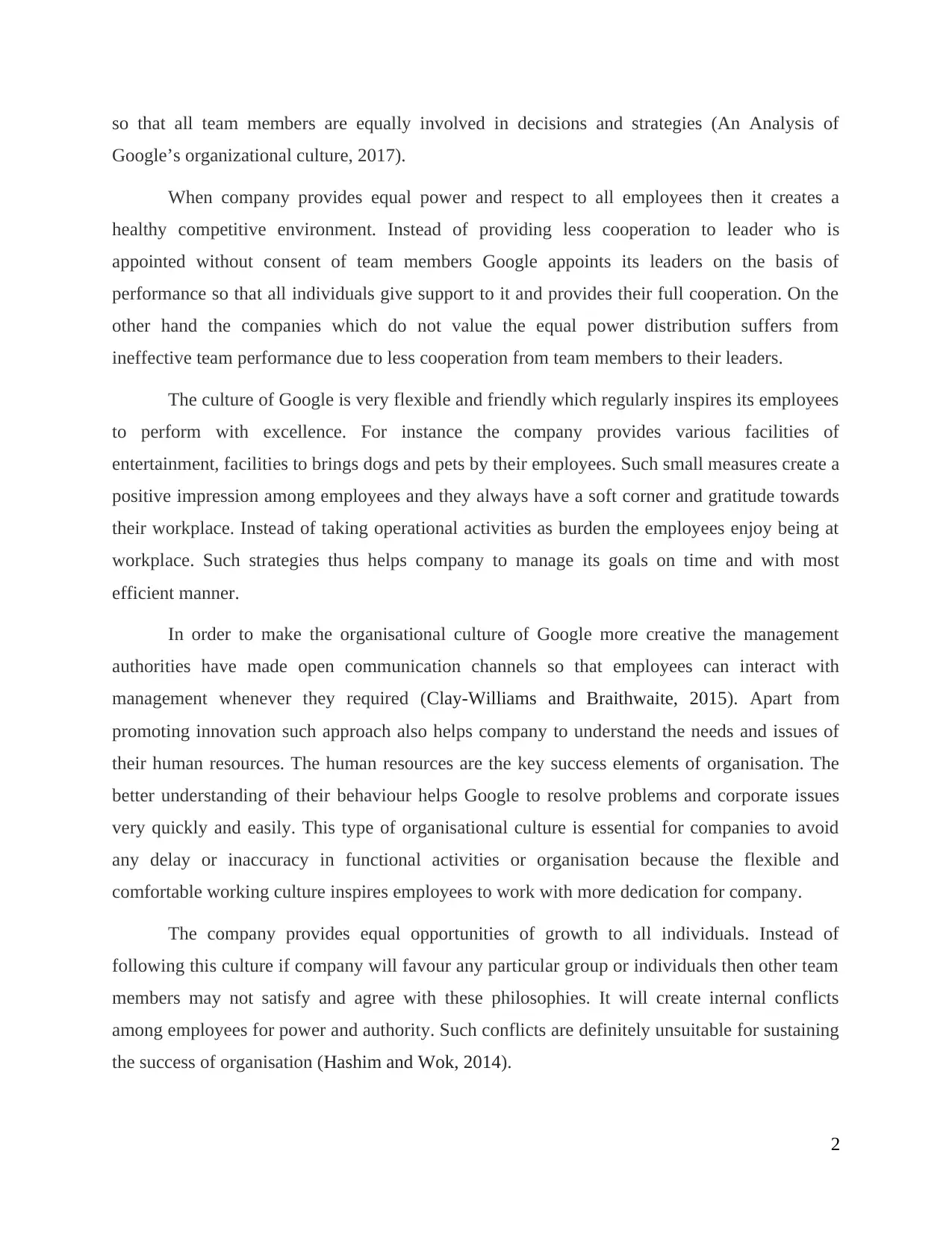
so that all team members are equally involved in decisions and strategies (An Analysis of
Google’s organizational culture, 2017).
When company provides equal power and respect to all employees then it creates a
healthy competitive environment. Instead of providing less cooperation to leader who is
appointed without consent of team members Google appoints its leaders on the basis of
performance so that all individuals give support to it and provides their full cooperation. On the
other hand the companies which do not value the equal power distribution suffers from
ineffective team performance due to less cooperation from team members to their leaders.
The culture of Google is very flexible and friendly which regularly inspires its employees
to perform with excellence. For instance the company provides various facilities of
entertainment, facilities to brings dogs and pets by their employees. Such small measures create a
positive impression among employees and they always have a soft corner and gratitude towards
their workplace. Instead of taking operational activities as burden the employees enjoy being at
workplace. Such strategies thus helps company to manage its goals on time and with most
efficient manner.
In order to make the organisational culture of Google more creative the management
authorities have made open communication channels so that employees can interact with
management whenever they required (Clay-Williams and Braithwaite, 2015). Apart from
promoting innovation such approach also helps company to understand the needs and issues of
their human resources. The human resources are the key success elements of organisation. The
better understanding of their behaviour helps Google to resolve problems and corporate issues
very quickly and easily. This type of organisational culture is essential for companies to avoid
any delay or inaccuracy in functional activities or organisation because the flexible and
comfortable working culture inspires employees to work with more dedication for company.
The company provides equal opportunities of growth to all individuals. Instead of
following this culture if company will favour any particular group or individuals then other team
members may not satisfy and agree with these philosophies. It will create internal conflicts
among employees for power and authority. Such conflicts are definitely unsuitable for sustaining
the success of organisation (Hashim and Wok, 2014).
2
Google’s organizational culture, 2017).
When company provides equal power and respect to all employees then it creates a
healthy competitive environment. Instead of providing less cooperation to leader who is
appointed without consent of team members Google appoints its leaders on the basis of
performance so that all individuals give support to it and provides their full cooperation. On the
other hand the companies which do not value the equal power distribution suffers from
ineffective team performance due to less cooperation from team members to their leaders.
The culture of Google is very flexible and friendly which regularly inspires its employees
to perform with excellence. For instance the company provides various facilities of
entertainment, facilities to brings dogs and pets by their employees. Such small measures create a
positive impression among employees and they always have a soft corner and gratitude towards
their workplace. Instead of taking operational activities as burden the employees enjoy being at
workplace. Such strategies thus helps company to manage its goals on time and with most
efficient manner.
In order to make the organisational culture of Google more creative the management
authorities have made open communication channels so that employees can interact with
management whenever they required (Clay-Williams and Braithwaite, 2015). Apart from
promoting innovation such approach also helps company to understand the needs and issues of
their human resources. The human resources are the key success elements of organisation. The
better understanding of their behaviour helps Google to resolve problems and corporate issues
very quickly and easily. This type of organisational culture is essential for companies to avoid
any delay or inaccuracy in functional activities or organisation because the flexible and
comfortable working culture inspires employees to work with more dedication for company.
The company provides equal opportunities of growth to all individuals. Instead of
following this culture if company will favour any particular group or individuals then other team
members may not satisfy and agree with these philosophies. It will create internal conflicts
among employees for power and authority. Such conflicts are definitely unsuitable for sustaining
the success of organisation (Hashim and Wok, 2014).
2
Paraphrase This Document
Need a fresh take? Get an instant paraphrase of this document with our AI Paraphraser
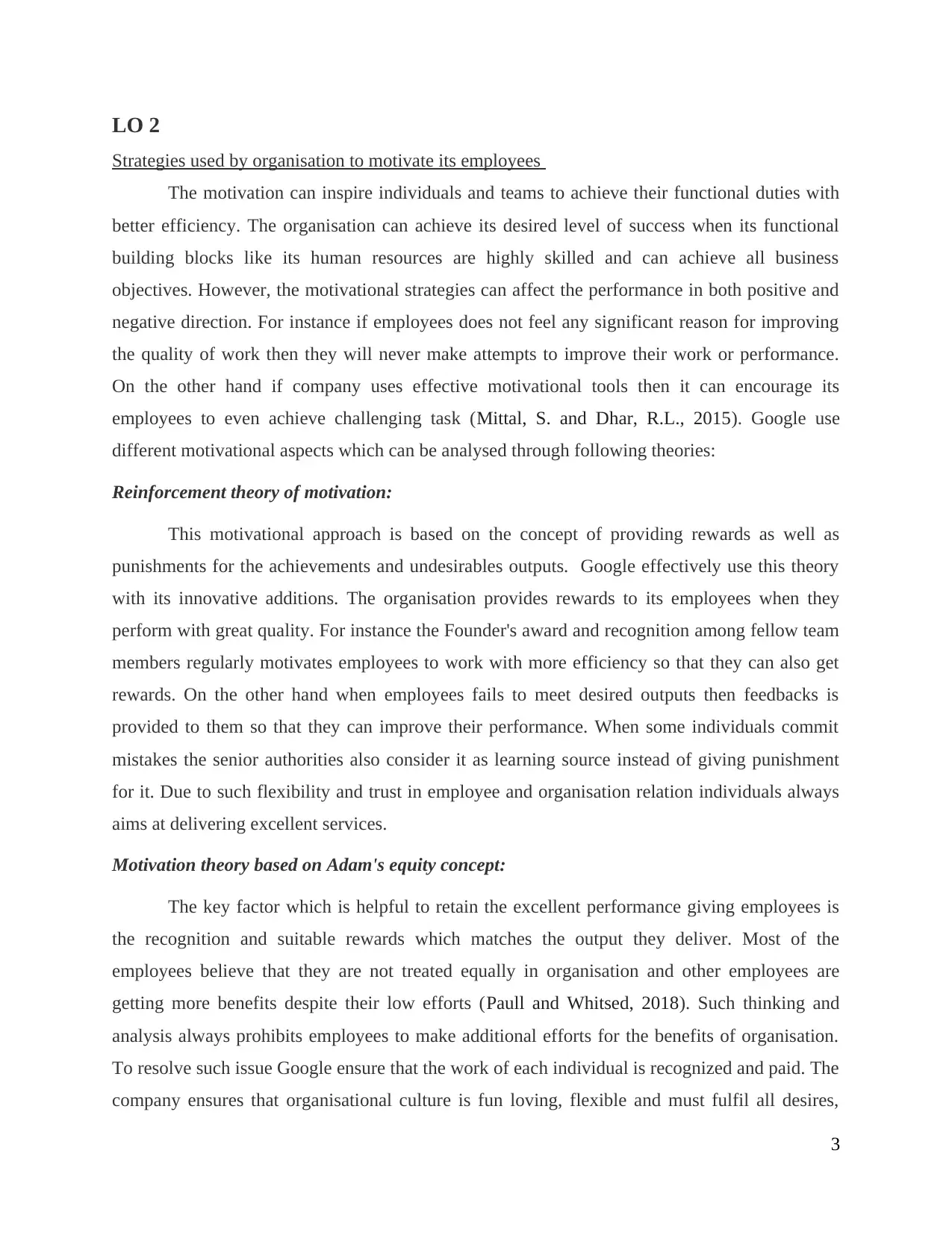
LO 2
Strategies used by organisation to motivate its employees
The motivation can inspire individuals and teams to achieve their functional duties with
better efficiency. The organisation can achieve its desired level of success when its functional
building blocks like its human resources are highly skilled and can achieve all business
objectives. However, the motivational strategies can affect the performance in both positive and
negative direction. For instance if employees does not feel any significant reason for improving
the quality of work then they will never make attempts to improve their work or performance.
On the other hand if company uses effective motivational tools then it can encourage its
employees to even achieve challenging task (Mittal, S. and Dhar, R.L., 2015). Google use
different motivational aspects which can be analysed through following theories:
Reinforcement theory of motivation:
This motivational approach is based on the concept of providing rewards as well as
punishments for the achievements and undesirables outputs. Google effectively use this theory
with its innovative additions. The organisation provides rewards to its employees when they
perform with great quality. For instance the Founder's award and recognition among fellow team
members regularly motivates employees to work with more efficiency so that they can also get
rewards. On the other hand when employees fails to meet desired outputs then feedbacks is
provided to them so that they can improve their performance. When some individuals commit
mistakes the senior authorities also consider it as learning source instead of giving punishment
for it. Due to such flexibility and trust in employee and organisation relation individuals always
aims at delivering excellent services.
Motivation theory based on Adam's equity concept:
The key factor which is helpful to retain the excellent performance giving employees is
the recognition and suitable rewards which matches the output they deliver. Most of the
employees believe that they are not treated equally in organisation and other employees are
getting more benefits despite their low efforts (Paull and Whitsed, 2018). Such thinking and
analysis always prohibits employees to make additional efforts for the benefits of organisation.
To resolve such issue Google ensure that the work of each individual is recognized and paid. The
company ensures that organisational culture is fun loving, flexible and must fulfil all desires,
3
Strategies used by organisation to motivate its employees
The motivation can inspire individuals and teams to achieve their functional duties with
better efficiency. The organisation can achieve its desired level of success when its functional
building blocks like its human resources are highly skilled and can achieve all business
objectives. However, the motivational strategies can affect the performance in both positive and
negative direction. For instance if employees does not feel any significant reason for improving
the quality of work then they will never make attempts to improve their work or performance.
On the other hand if company uses effective motivational tools then it can encourage its
employees to even achieve challenging task (Mittal, S. and Dhar, R.L., 2015). Google use
different motivational aspects which can be analysed through following theories:
Reinforcement theory of motivation:
This motivational approach is based on the concept of providing rewards as well as
punishments for the achievements and undesirables outputs. Google effectively use this theory
with its innovative additions. The organisation provides rewards to its employees when they
perform with great quality. For instance the Founder's award and recognition among fellow team
members regularly motivates employees to work with more efficiency so that they can also get
rewards. On the other hand when employees fails to meet desired outputs then feedbacks is
provided to them so that they can improve their performance. When some individuals commit
mistakes the senior authorities also consider it as learning source instead of giving punishment
for it. Due to such flexibility and trust in employee and organisation relation individuals always
aims at delivering excellent services.
Motivation theory based on Adam's equity concept:
The key factor which is helpful to retain the excellent performance giving employees is
the recognition and suitable rewards which matches the output they deliver. Most of the
employees believe that they are not treated equally in organisation and other employees are
getting more benefits despite their low efforts (Paull and Whitsed, 2018). Such thinking and
analysis always prohibits employees to make additional efforts for the benefits of organisation.
To resolve such issue Google ensure that the work of each individual is recognized and paid. The
company ensures that organisational culture is fun loving, flexible and must fulfil all desires,
3
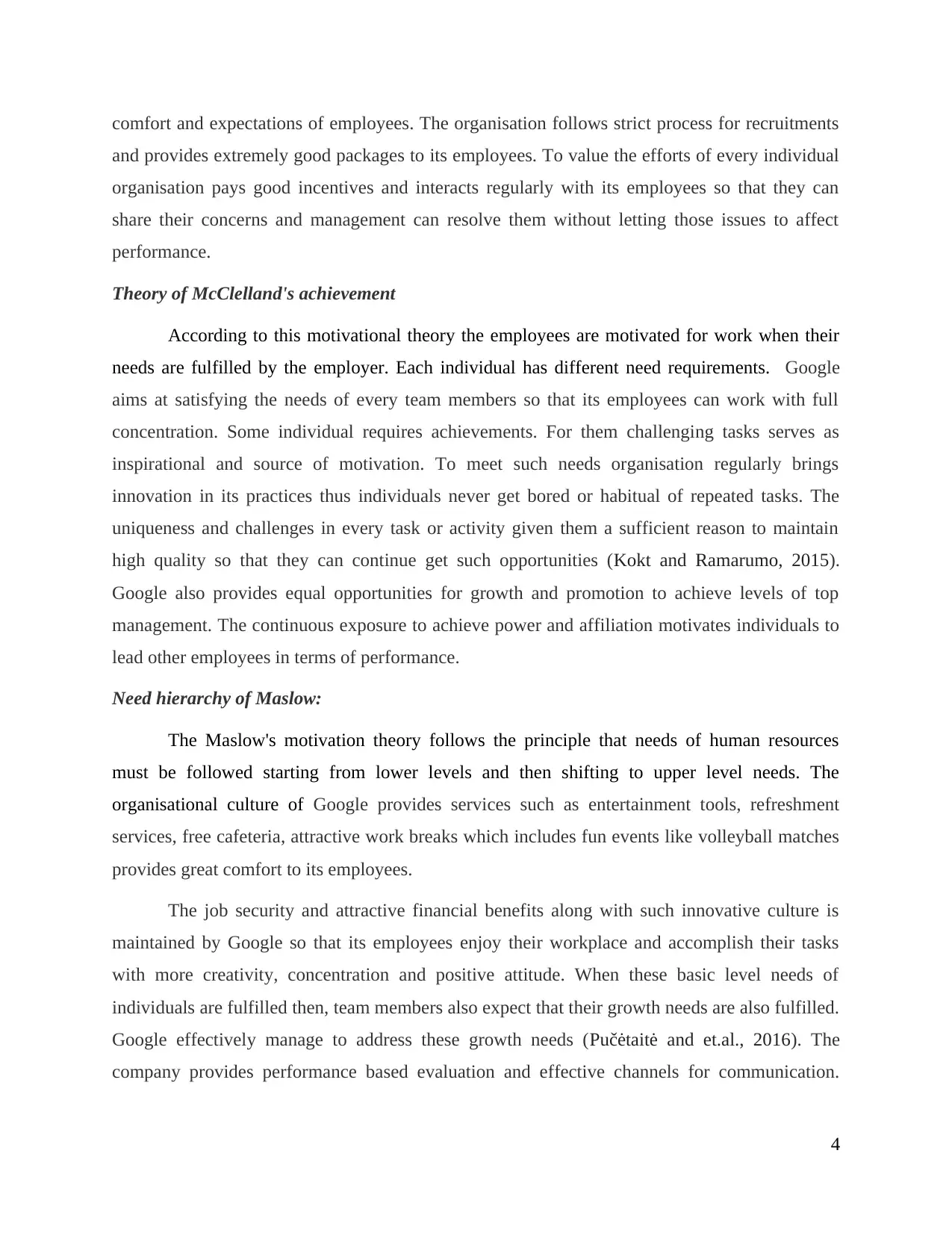
comfort and expectations of employees. The organisation follows strict process for recruitments
and provides extremely good packages to its employees. To value the efforts of every individual
organisation pays good incentives and interacts regularly with its employees so that they can
share their concerns and management can resolve them without letting those issues to affect
performance.
Theory of McClelland's achievement
According to this motivational theory the employees are motivated for work when their
needs are fulfilled by the employer. Each individual has different need requirements. Google
aims at satisfying the needs of every team members so that its employees can work with full
concentration. Some individual requires achievements. For them challenging tasks serves as
inspirational and source of motivation. To meet such needs organisation regularly brings
innovation in its practices thus individuals never get bored or habitual of repeated tasks. The
uniqueness and challenges in every task or activity given them a sufficient reason to maintain
high quality so that they can continue get such opportunities (Kokt and Ramarumo, 2015).
Google also provides equal opportunities for growth and promotion to achieve levels of top
management. The continuous exposure to achieve power and affiliation motivates individuals to
lead other employees in terms of performance.
Need hierarchy of Maslow:
The Maslow's motivation theory follows the principle that needs of human resources
must be followed starting from lower levels and then shifting to upper level needs. The
organisational culture of Google provides services such as entertainment tools, refreshment
services, free cafeteria, attractive work breaks which includes fun events like volleyball matches
provides great comfort to its employees.
The job security and attractive financial benefits along with such innovative culture is
maintained by Google so that its employees enjoy their workplace and accomplish their tasks
with more creativity, concentration and positive attitude. When these basic level needs of
individuals are fulfilled then, team members also expect that their growth needs are also fulfilled.
Google effectively manage to address these growth needs (Pučėtaitė and et.al., 2016). The
company provides performance based evaluation and effective channels for communication.
4
and provides extremely good packages to its employees. To value the efforts of every individual
organisation pays good incentives and interacts regularly with its employees so that they can
share their concerns and management can resolve them without letting those issues to affect
performance.
Theory of McClelland's achievement
According to this motivational theory the employees are motivated for work when their
needs are fulfilled by the employer. Each individual has different need requirements. Google
aims at satisfying the needs of every team members so that its employees can work with full
concentration. Some individual requires achievements. For them challenging tasks serves as
inspirational and source of motivation. To meet such needs organisation regularly brings
innovation in its practices thus individuals never get bored or habitual of repeated tasks. The
uniqueness and challenges in every task or activity given them a sufficient reason to maintain
high quality so that they can continue get such opportunities (Kokt and Ramarumo, 2015).
Google also provides equal opportunities for growth and promotion to achieve levels of top
management. The continuous exposure to achieve power and affiliation motivates individuals to
lead other employees in terms of performance.
Need hierarchy of Maslow:
The Maslow's motivation theory follows the principle that needs of human resources
must be followed starting from lower levels and then shifting to upper level needs. The
organisational culture of Google provides services such as entertainment tools, refreshment
services, free cafeteria, attractive work breaks which includes fun events like volleyball matches
provides great comfort to its employees.
The job security and attractive financial benefits along with such innovative culture is
maintained by Google so that its employees enjoy their workplace and accomplish their tasks
with more creativity, concentration and positive attitude. When these basic level needs of
individuals are fulfilled then, team members also expect that their growth needs are also fulfilled.
Google effectively manage to address these growth needs (Pučėtaitė and et.al., 2016). The
company provides performance based evaluation and effective channels for communication.
4
⊘ This is a preview!⊘
Do you want full access?
Subscribe today to unlock all pages.

Trusted by 1+ million students worldwide
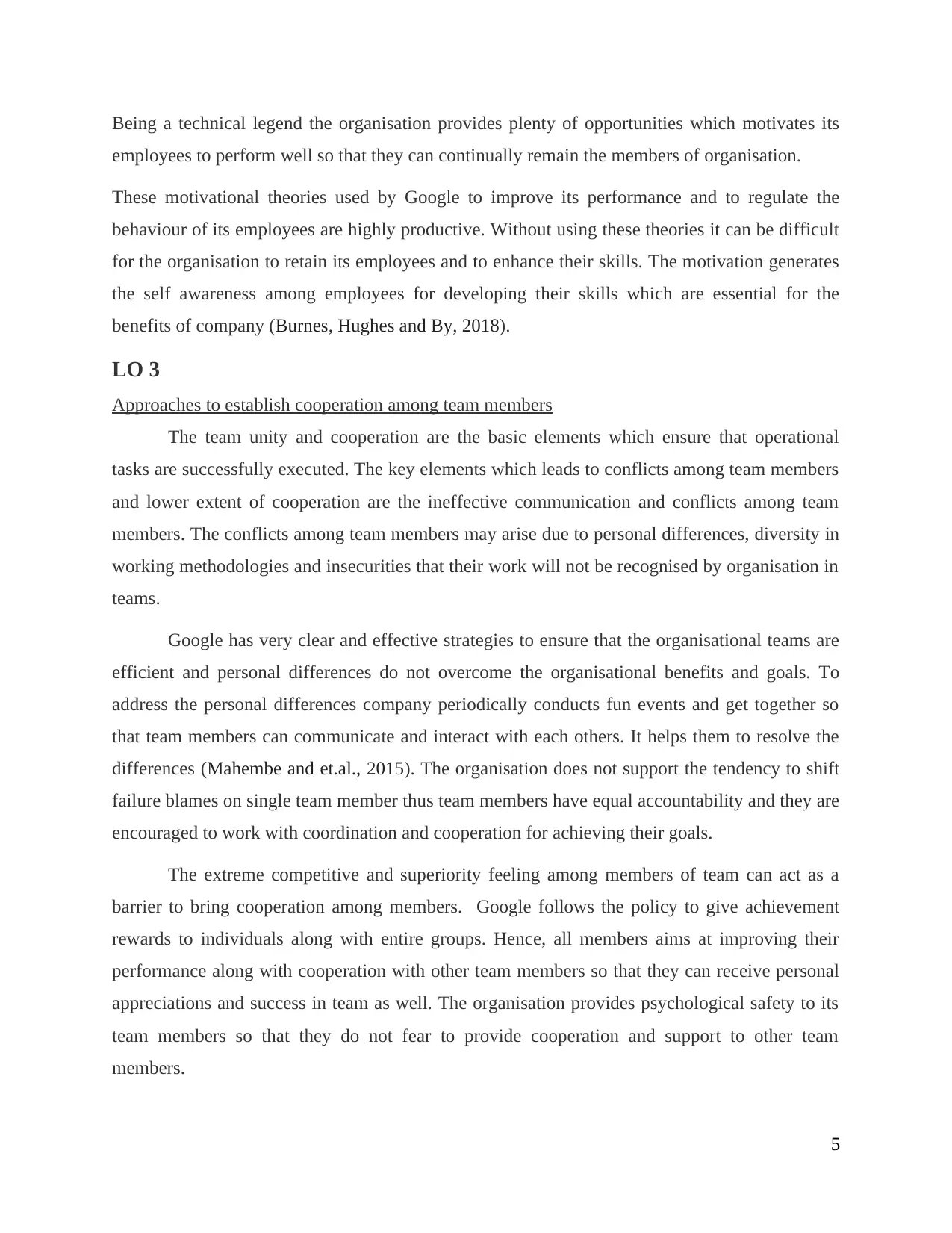
Being a technical legend the organisation provides plenty of opportunities which motivates its
employees to perform well so that they can continually remain the members of organisation.
These motivational theories used by Google to improve its performance and to regulate the
behaviour of its employees are highly productive. Without using these theories it can be difficult
for the organisation to retain its employees and to enhance their skills. The motivation generates
the self awareness among employees for developing their skills which are essential for the
benefits of company (Burnes, Hughes and By, 2018).
LO 3
Approaches to establish cooperation among team members
The team unity and cooperation are the basic elements which ensure that operational
tasks are successfully executed. The key elements which leads to conflicts among team members
and lower extent of cooperation are the ineffective communication and conflicts among team
members. The conflicts among team members may arise due to personal differences, diversity in
working methodologies and insecurities that their work will not be recognised by organisation in
teams.
Google has very clear and effective strategies to ensure that the organisational teams are
efficient and personal differences do not overcome the organisational benefits and goals. To
address the personal differences company periodically conducts fun events and get together so
that team members can communicate and interact with each others. It helps them to resolve the
differences (Mahembe and et.al., 2015). The organisation does not support the tendency to shift
failure blames on single team member thus team members have equal accountability and they are
encouraged to work with coordination and cooperation for achieving their goals.
The extreme competitive and superiority feeling among members of team can act as a
barrier to bring cooperation among members. Google follows the policy to give achievement
rewards to individuals along with entire groups. Hence, all members aims at improving their
performance along with cooperation with other team members so that they can receive personal
appreciations and success in team as well. The organisation provides psychological safety to its
team members so that they do not fear to provide cooperation and support to other team
members.
5
employees to perform well so that they can continually remain the members of organisation.
These motivational theories used by Google to improve its performance and to regulate the
behaviour of its employees are highly productive. Without using these theories it can be difficult
for the organisation to retain its employees and to enhance their skills. The motivation generates
the self awareness among employees for developing their skills which are essential for the
benefits of company (Burnes, Hughes and By, 2018).
LO 3
Approaches to establish cooperation among team members
The team unity and cooperation are the basic elements which ensure that operational
tasks are successfully executed. The key elements which leads to conflicts among team members
and lower extent of cooperation are the ineffective communication and conflicts among team
members. The conflicts among team members may arise due to personal differences, diversity in
working methodologies and insecurities that their work will not be recognised by organisation in
teams.
Google has very clear and effective strategies to ensure that the organisational teams are
efficient and personal differences do not overcome the organisational benefits and goals. To
address the personal differences company periodically conducts fun events and get together so
that team members can communicate and interact with each others. It helps them to resolve the
differences (Mahembe and et.al., 2015). The organisation does not support the tendency to shift
failure blames on single team member thus team members have equal accountability and they are
encouraged to work with coordination and cooperation for achieving their goals.
The extreme competitive and superiority feeling among members of team can act as a
barrier to bring cooperation among members. Google follows the policy to give achievement
rewards to individuals along with entire groups. Hence, all members aims at improving their
performance along with cooperation with other team members so that they can receive personal
appreciations and success in team as well. The organisation provides psychological safety to its
team members so that they do not fear to provide cooperation and support to other team
members.
5
Paraphrase This Document
Need a fresh take? Get an instant paraphrase of this document with our AI Paraphraser
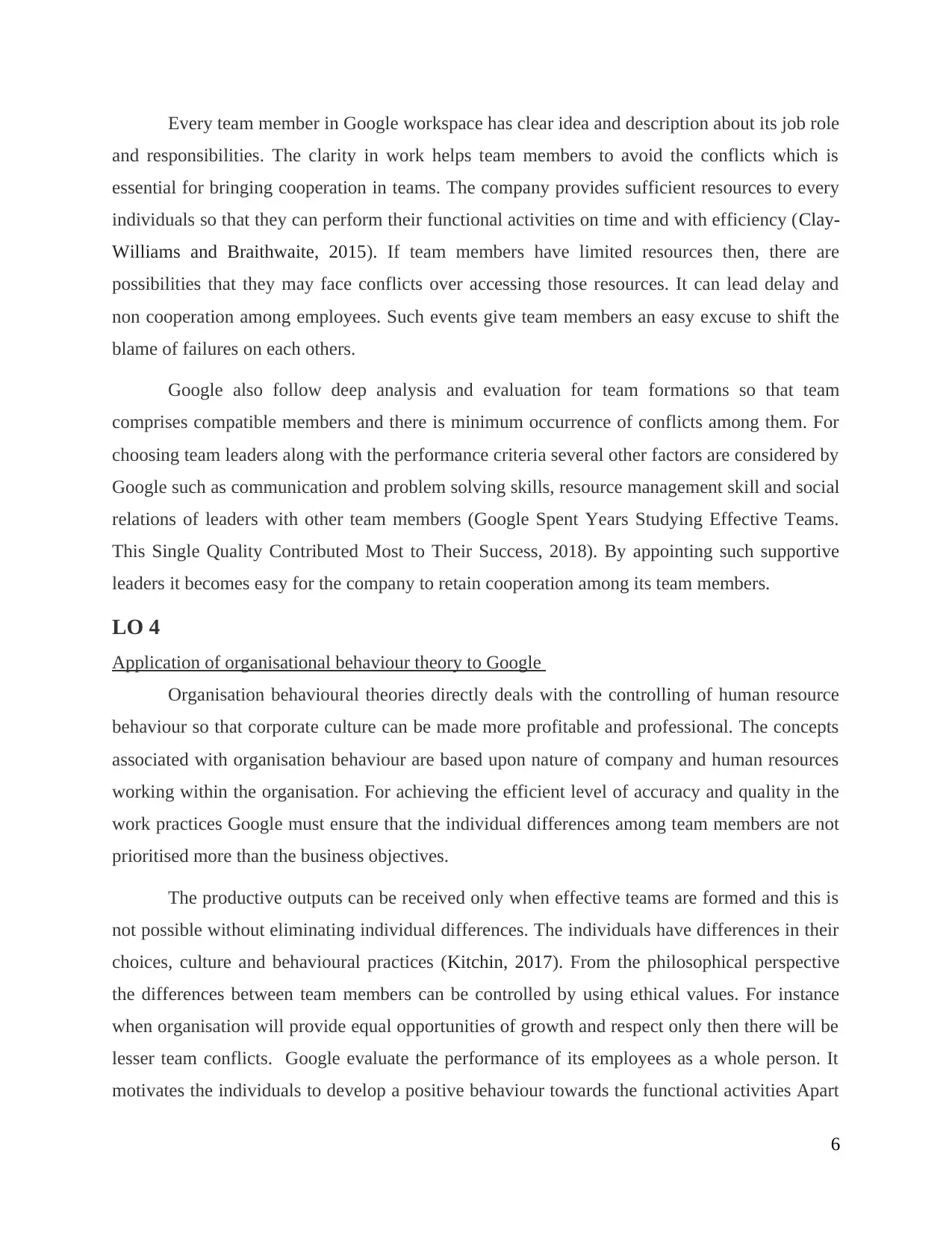
Every team member in Google workspace has clear idea and description about its job role
and responsibilities. The clarity in work helps team members to avoid the conflicts which is
essential for bringing cooperation in teams. The company provides sufficient resources to every
individuals so that they can perform their functional activities on time and with efficiency (Clay-
Williams and Braithwaite, 2015). If team members have limited resources then, there are
possibilities that they may face conflicts over accessing those resources. It can lead delay and
non cooperation among employees. Such events give team members an easy excuse to shift the
blame of failures on each others.
Google also follow deep analysis and evaluation for team formations so that team
comprises compatible members and there is minimum occurrence of conflicts among them. For
choosing team leaders along with the performance criteria several other factors are considered by
Google such as communication and problem solving skills, resource management skill and social
relations of leaders with other team members (Google Spent Years Studying Effective Teams.
This Single Quality Contributed Most to Their Success, 2018). By appointing such supportive
leaders it becomes easy for the company to retain cooperation among its team members.
LO 4
Application of organisational behaviour theory to Google
Organisation behavioural theories directly deals with the controlling of human resource
behaviour so that corporate culture can be made more profitable and professional. The concepts
associated with organisation behaviour are based upon nature of company and human resources
working within the organisation. For achieving the efficient level of accuracy and quality in the
work practices Google must ensure that the individual differences among team members are not
prioritised more than the business objectives.
The productive outputs can be received only when effective teams are formed and this is
not possible without eliminating individual differences. The individuals have differences in their
choices, culture and behavioural practices (Kitchin, 2017). From the philosophical perspective
the differences between team members can be controlled by using ethical values. For instance
when organisation will provide equal opportunities of growth and respect only then there will be
lesser team conflicts. Google evaluate the performance of its employees as a whole person. It
motivates the individuals to develop a positive behaviour towards the functional activities Apart
6
and responsibilities. The clarity in work helps team members to avoid the conflicts which is
essential for bringing cooperation in teams. The company provides sufficient resources to every
individuals so that they can perform their functional activities on time and with efficiency (Clay-
Williams and Braithwaite, 2015). If team members have limited resources then, there are
possibilities that they may face conflicts over accessing those resources. It can lead delay and
non cooperation among employees. Such events give team members an easy excuse to shift the
blame of failures on each others.
Google also follow deep analysis and evaluation for team formations so that team
comprises compatible members and there is minimum occurrence of conflicts among them. For
choosing team leaders along with the performance criteria several other factors are considered by
Google such as communication and problem solving skills, resource management skill and social
relations of leaders with other team members (Google Spent Years Studying Effective Teams.
This Single Quality Contributed Most to Their Success, 2018). By appointing such supportive
leaders it becomes easy for the company to retain cooperation among its team members.
LO 4
Application of organisational behaviour theory to Google
Organisation behavioural theories directly deals with the controlling of human resource
behaviour so that corporate culture can be made more profitable and professional. The concepts
associated with organisation behaviour are based upon nature of company and human resources
working within the organisation. For achieving the efficient level of accuracy and quality in the
work practices Google must ensure that the individual differences among team members are not
prioritised more than the business objectives.
The productive outputs can be received only when effective teams are formed and this is
not possible without eliminating individual differences. The individuals have differences in their
choices, culture and behavioural practices (Kitchin, 2017). From the philosophical perspective
the differences between team members can be controlled by using ethical values. For instance
when organisation will provide equal opportunities of growth and respect only then there will be
lesser team conflicts. Google evaluate the performance of its employees as a whole person. It
motivates the individuals to develop a positive behaviour towards the functional activities Apart
6
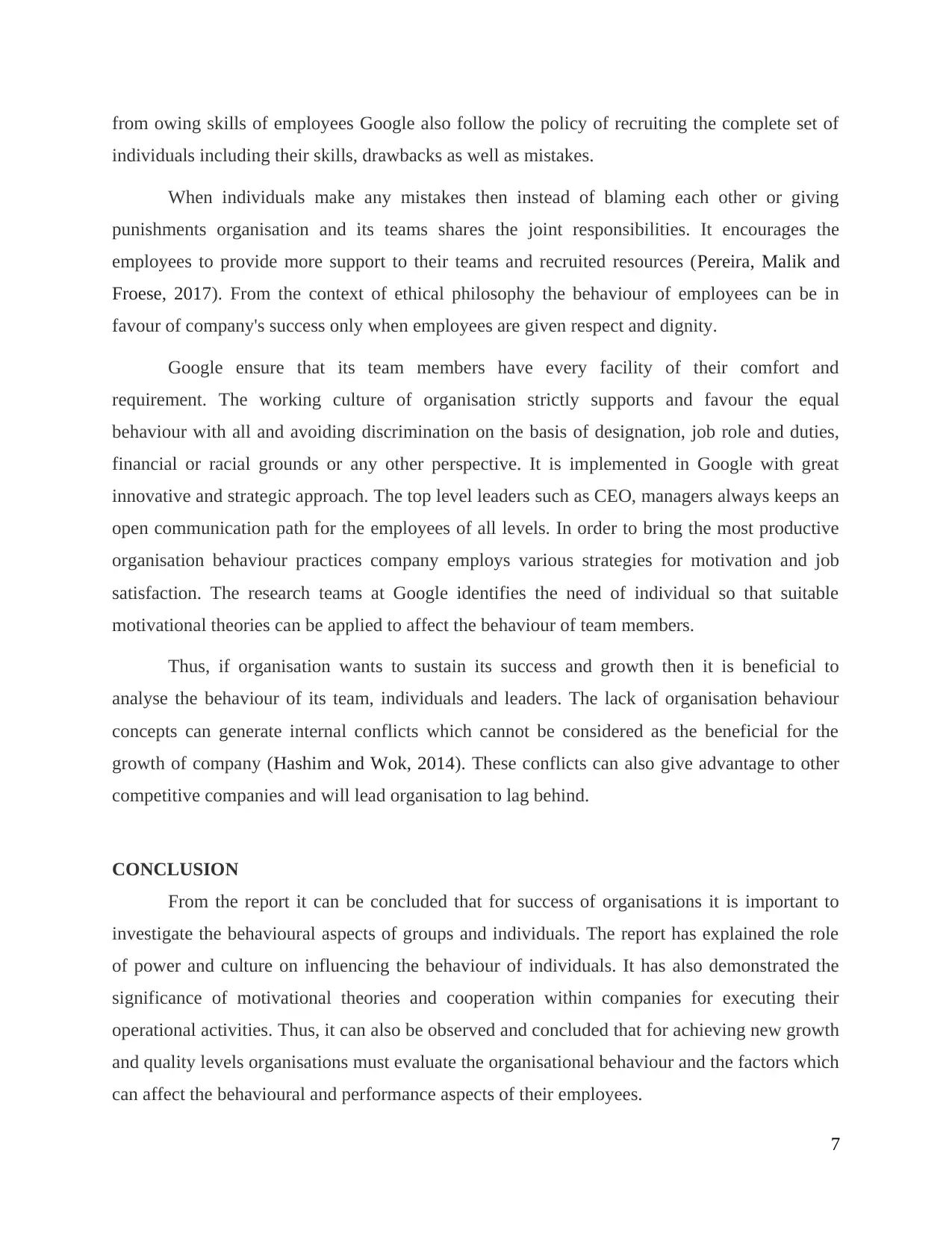
from owing skills of employees Google also follow the policy of recruiting the complete set of
individuals including their skills, drawbacks as well as mistakes.
When individuals make any mistakes then instead of blaming each other or giving
punishments organisation and its teams shares the joint responsibilities. It encourages the
employees to provide more support to their teams and recruited resources (Pereira, Malik and
Froese, 2017). From the context of ethical philosophy the behaviour of employees can be in
favour of company's success only when employees are given respect and dignity.
Google ensure that its team members have every facility of their comfort and
requirement. The working culture of organisation strictly supports and favour the equal
behaviour with all and avoiding discrimination on the basis of designation, job role and duties,
financial or racial grounds or any other perspective. It is implemented in Google with great
innovative and strategic approach. The top level leaders such as CEO, managers always keeps an
open communication path for the employees of all levels. In order to bring the most productive
organisation behaviour practices company employs various strategies for motivation and job
satisfaction. The research teams at Google identifies the need of individual so that suitable
motivational theories can be applied to affect the behaviour of team members.
Thus, if organisation wants to sustain its success and growth then it is beneficial to
analyse the behaviour of its team, individuals and leaders. The lack of organisation behaviour
concepts can generate internal conflicts which cannot be considered as the beneficial for the
growth of company (Hashim and Wok, 2014). These conflicts can also give advantage to other
competitive companies and will lead organisation to lag behind.
CONCLUSION
From the report it can be concluded that for success of organisations it is important to
investigate the behavioural aspects of groups and individuals. The report has explained the role
of power and culture on influencing the behaviour of individuals. It has also demonstrated the
significance of motivational theories and cooperation within companies for executing their
operational activities. Thus, it can also be observed and concluded that for achieving new growth
and quality levels organisations must evaluate the organisational behaviour and the factors which
can affect the behavioural and performance aspects of their employees.
7
individuals including their skills, drawbacks as well as mistakes.
When individuals make any mistakes then instead of blaming each other or giving
punishments organisation and its teams shares the joint responsibilities. It encourages the
employees to provide more support to their teams and recruited resources (Pereira, Malik and
Froese, 2017). From the context of ethical philosophy the behaviour of employees can be in
favour of company's success only when employees are given respect and dignity.
Google ensure that its team members have every facility of their comfort and
requirement. The working culture of organisation strictly supports and favour the equal
behaviour with all and avoiding discrimination on the basis of designation, job role and duties,
financial or racial grounds or any other perspective. It is implemented in Google with great
innovative and strategic approach. The top level leaders such as CEO, managers always keeps an
open communication path for the employees of all levels. In order to bring the most productive
organisation behaviour practices company employs various strategies for motivation and job
satisfaction. The research teams at Google identifies the need of individual so that suitable
motivational theories can be applied to affect the behaviour of team members.
Thus, if organisation wants to sustain its success and growth then it is beneficial to
analyse the behaviour of its team, individuals and leaders. The lack of organisation behaviour
concepts can generate internal conflicts which cannot be considered as the beneficial for the
growth of company (Hashim and Wok, 2014). These conflicts can also give advantage to other
competitive companies and will lead organisation to lag behind.
CONCLUSION
From the report it can be concluded that for success of organisations it is important to
investigate the behavioural aspects of groups and individuals. The report has explained the role
of power and culture on influencing the behaviour of individuals. It has also demonstrated the
significance of motivational theories and cooperation within companies for executing their
operational activities. Thus, it can also be observed and concluded that for achieving new growth
and quality levels organisations must evaluate the organisational behaviour and the factors which
can affect the behavioural and performance aspects of their employees.
7
⊘ This is a preview!⊘
Do you want full access?
Subscribe today to unlock all pages.

Trusted by 1+ million students worldwide
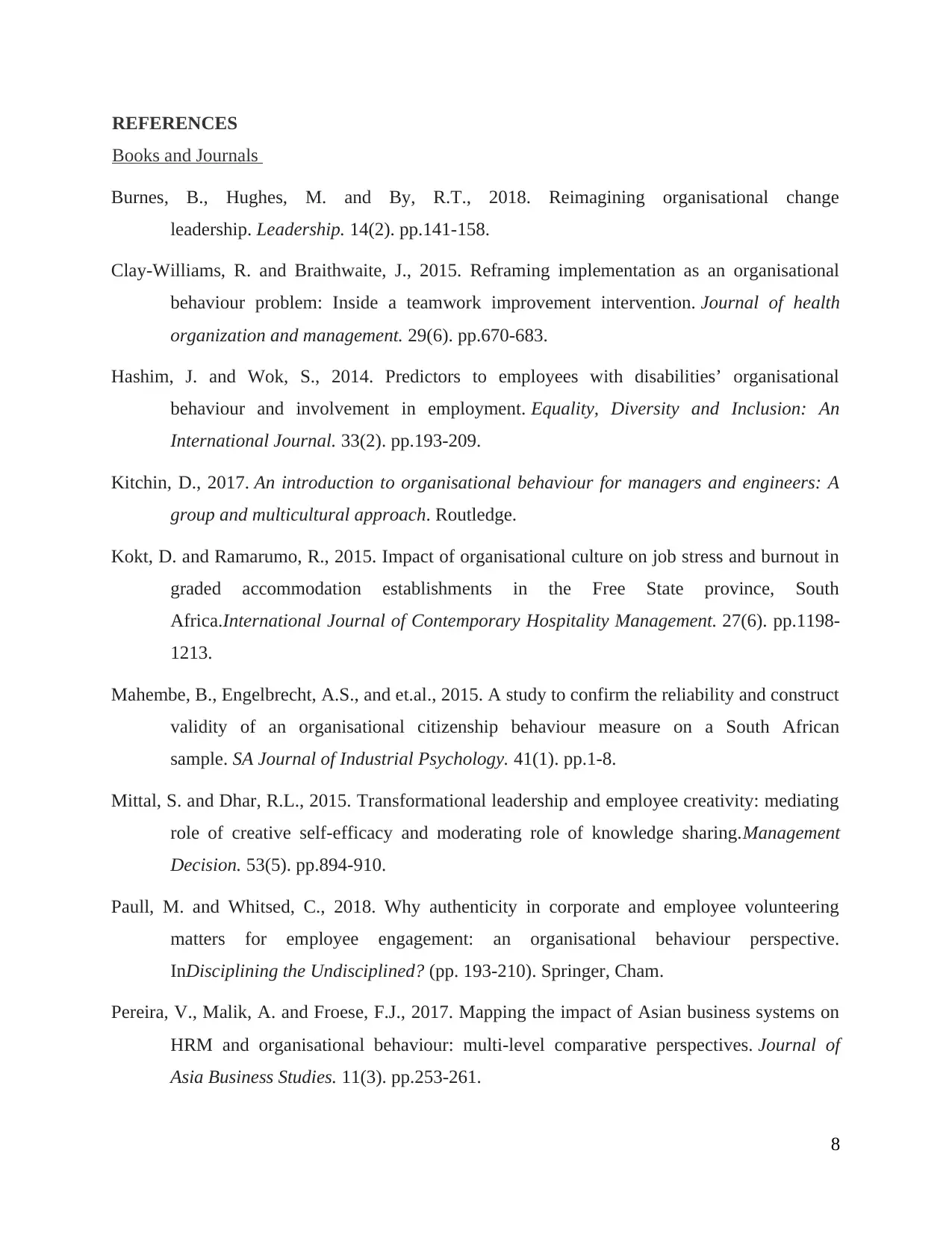
REFERENCES
Books and Journals
Burnes, B., Hughes, M. and By, R.T., 2018. Reimagining organisational change
leadership. Leadership. 14(2). pp.141-158.
Clay-Williams, R. and Braithwaite, J., 2015. Reframing implementation as an organisational
behaviour problem: Inside a teamwork improvement intervention. Journal of health
organization and management. 29(6). pp.670-683.
Hashim, J. and Wok, S., 2014. Predictors to employees with disabilities’ organisational
behaviour and involvement in employment. Equality, Diversity and Inclusion: An
International Journal. 33(2). pp.193-209.
Kitchin, D., 2017. An introduction to organisational behaviour for managers and engineers: A
group and multicultural approach. Routledge.
Kokt, D. and Ramarumo, R., 2015. Impact of organisational culture on job stress and burnout in
graded accommodation establishments in the Free State province, South
Africa.International Journal of Contemporary Hospitality Management. 27(6). pp.1198-
1213.
Mahembe, B., Engelbrecht, A.S., and et.al., 2015. A study to confirm the reliability and construct
validity of an organisational citizenship behaviour measure on a South African
sample. SA Journal of Industrial Psychology. 41(1). pp.1-8.
Mittal, S. and Dhar, R.L., 2015. Transformational leadership and employee creativity: mediating
role of creative self-efficacy and moderating role of knowledge sharing.Management
Decision. 53(5). pp.894-910.
Paull, M. and Whitsed, C., 2018. Why authenticity in corporate and employee volunteering
matters for employee engagement: an organisational behaviour perspective.
InDisciplining the Undisciplined? (pp. 193-210). Springer, Cham.
Pereira, V., Malik, A. and Froese, F.J., 2017. Mapping the impact of Asian business systems on
HRM and organisational behaviour: multi-level comparative perspectives. Journal of
Asia Business Studies. 11(3). pp.253-261.
8
Books and Journals
Burnes, B., Hughes, M. and By, R.T., 2018. Reimagining organisational change
leadership. Leadership. 14(2). pp.141-158.
Clay-Williams, R. and Braithwaite, J., 2015. Reframing implementation as an organisational
behaviour problem: Inside a teamwork improvement intervention. Journal of health
organization and management. 29(6). pp.670-683.
Hashim, J. and Wok, S., 2014. Predictors to employees with disabilities’ organisational
behaviour and involvement in employment. Equality, Diversity and Inclusion: An
International Journal. 33(2). pp.193-209.
Kitchin, D., 2017. An introduction to organisational behaviour for managers and engineers: A
group and multicultural approach. Routledge.
Kokt, D. and Ramarumo, R., 2015. Impact of organisational culture on job stress and burnout in
graded accommodation establishments in the Free State province, South
Africa.International Journal of Contemporary Hospitality Management. 27(6). pp.1198-
1213.
Mahembe, B., Engelbrecht, A.S., and et.al., 2015. A study to confirm the reliability and construct
validity of an organisational citizenship behaviour measure on a South African
sample. SA Journal of Industrial Psychology. 41(1). pp.1-8.
Mittal, S. and Dhar, R.L., 2015. Transformational leadership and employee creativity: mediating
role of creative self-efficacy and moderating role of knowledge sharing.Management
Decision. 53(5). pp.894-910.
Paull, M. and Whitsed, C., 2018. Why authenticity in corporate and employee volunteering
matters for employee engagement: an organisational behaviour perspective.
InDisciplining the Undisciplined? (pp. 193-210). Springer, Cham.
Pereira, V., Malik, A. and Froese, F.J., 2017. Mapping the impact of Asian business systems on
HRM and organisational behaviour: multi-level comparative perspectives. Journal of
Asia Business Studies. 11(3). pp.253-261.
8
Paraphrase This Document
Need a fresh take? Get an instant paraphrase of this document with our AI Paraphraser
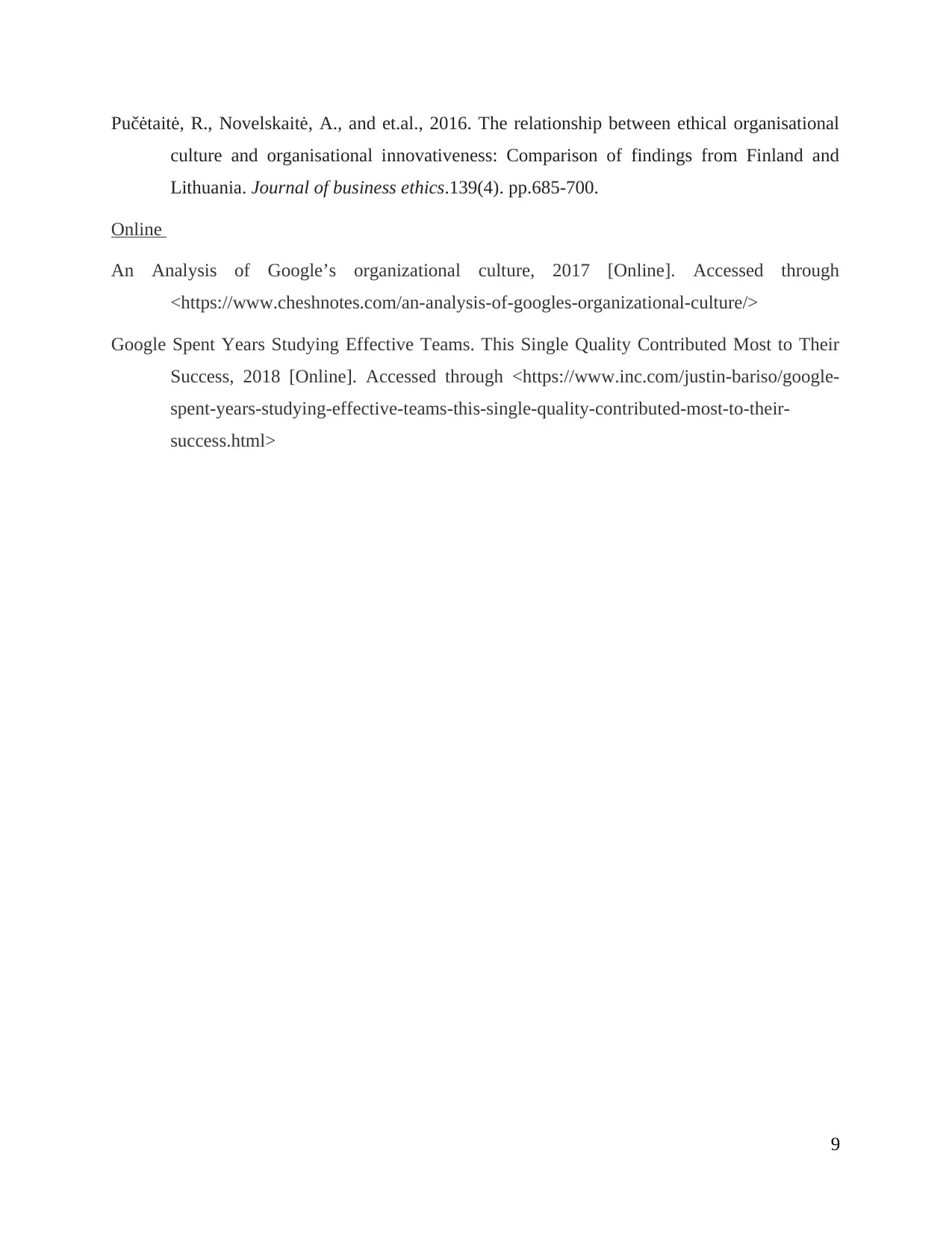
Pučėtaitė, R., Novelskaitė, A., and et.al., 2016. The relationship between ethical organisational
culture and organisational innovativeness: Comparison of findings from Finland and
Lithuania. Journal of business ethics.139(4). pp.685-700.
Online
An Analysis of Google’s organizational culture, 2017 [Online]. Accessed through
<https://www.cheshnotes.com/an-analysis-of-googles-organizational-culture/>
Google Spent Years Studying Effective Teams. This Single Quality Contributed Most to Their
Success, 2018 [Online]. Accessed through <https://www.inc.com/justin-bariso/google-
spent-years-studying-effective-teams-this-single-quality-contributed-most-to-their-
success.html>
9
culture and organisational innovativeness: Comparison of findings from Finland and
Lithuania. Journal of business ethics.139(4). pp.685-700.
Online
An Analysis of Google’s organizational culture, 2017 [Online]. Accessed through
<https://www.cheshnotes.com/an-analysis-of-googles-organizational-culture/>
Google Spent Years Studying Effective Teams. This Single Quality Contributed Most to Their
Success, 2018 [Online]. Accessed through <https://www.inc.com/justin-bariso/google-
spent-years-studying-effective-teams-this-single-quality-contributed-most-to-their-
success.html>
9
1 out of 11
Related Documents
Your All-in-One AI-Powered Toolkit for Academic Success.
+13062052269
info@desklib.com
Available 24*7 on WhatsApp / Email
![[object Object]](/_next/static/media/star-bottom.7253800d.svg)
Unlock your academic potential
Copyright © 2020–2026 A2Z Services. All Rights Reserved. Developed and managed by ZUCOL.




